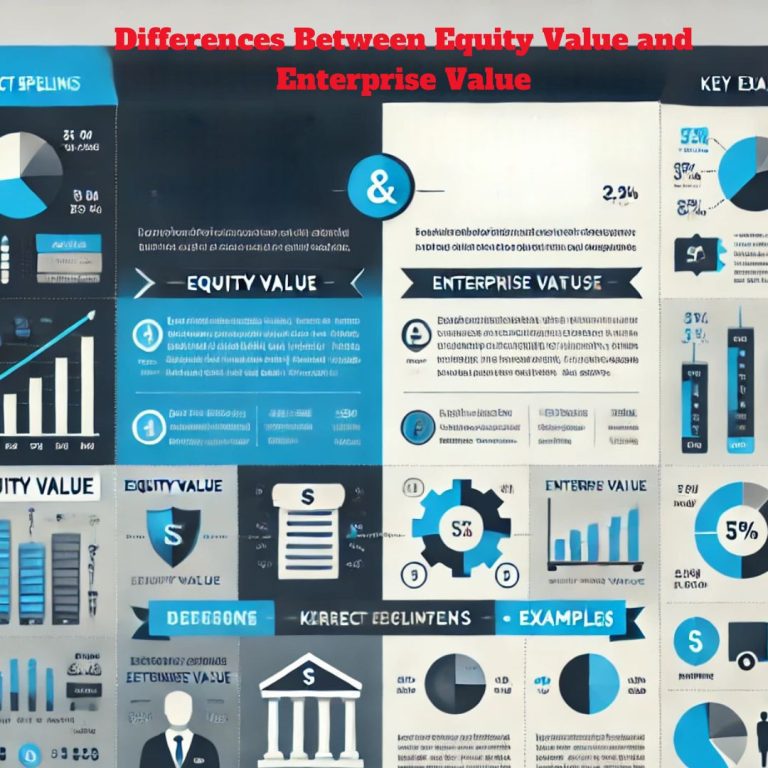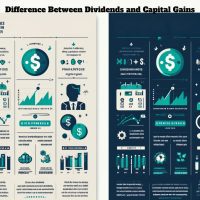The Difference Between Equity Value and Enterprise Value lies in their scope and application in financial analysis. Equity Value reflects the market value of shareholders’ ownership in a company, while Enterprise Value provides a comprehensive measure of a company’s total valuation, considering debt and cash. These metrics are essential for investors, analysts, and stakeholders to evaluate a company’s financial health, compare investment opportunities, and understand its overall capital structure.
What Is Enterprise Value?
Enterprise Value (EV) is the total valuation of a company, representing its market value as perceived by all stakeholders, including equity and debt holders. It reflects the cost of acquiring the entire business, free from capital structure considerations.
Formula
Where:
- Net Debt = Total Debt – Cash & Cash Equivalents.
Key Features
- Comprehensive Metric: Includes all financial obligations.
- Capital-Structure Neutral: Useful for comparing companies with different financing methods.
- Relevance: Frequently used in mergers and acquisitions (M&A) to determine the purchase price.
Example
A company with an equity value of $100 million, debt of $50 million, and cash of $10 million would have an EV of $140 million ($100M + $50M – $10M).
Significance:
- Reflects the total cost to acquire the company, including the assumption of debt.
- Used in valuation ratios like EV/EBITDA.
What Is Equity Value?
Equity Value is the value of a company attributable to its shareholders. It represents the current market capitalization of the company, which is the share price multiplied by the total number of outstanding shares.
Formula
Key Features:
- Shareholder-Focused: Reflects ownership interests.
- Market-Driven: Fluctuates with stock market conditions.
- Primary Use: Indicates how much equity shareholders would receive in a sale.
Example
If a company has 10 million shares trading at $20 per share, its Equity Value would be $200 million.
Significance
- Used to assess a company’s market capitalization.
- Reflects shareholder returns and ownership.
What Is a Controlling Interest in a Company?
A controlling interest refers to ownership of a sufficient percentage of a company’s equity, allowing the holder to influence or dictate major business decisions. This usually requires ownership of more than 50% of voting shares.
Importance
- Strategic Control: Provides the ability to set corporate policies and appoint management.
- Valuation Impact: The price paid for a controlling interest often includes a premium above the Equity Value.
Example
If an investor acquires 55% of a company’s shares, they hold a controlling interest, enabling them to make decisions like mergers or changes in corporate strategy.
What Is a Capital Structure?
Capital structure refers to the mix of debt, equity, and other securities a company uses to finance its operations and growth. It is a critical factor in determining the cost of capital and risk exposure.
Components of Capital Structure
- Debt: Includes loans, bonds, and other fixed-income instruments.
- Equity: Includes common shares and retained earnings.
- Preferred Shares: Hybrid instruments with features of both debt and equity.
Importance
- Risk Management: Affects the company’s leverage and financial stability.
- Cost of Capital: Determines the company’s weighted average cost of capital (WACC).
Example Table: Capital Structure Components
| Component | Description |
| Debt | Borrowed funds to be repaid with interest. |
| Equity | Ownership shares in the company. |
| Preferred Shares | Hybrid securities with fixed dividends. |
What Are Preferred Shares?
Preferred shares are a type of equity that provides a fixed dividend to shareholders, ranking above common equity but below debt in terms of claims on assets during liquidation.
Key Features:
- Fixed Dividends: Guaranteed payments before common shareholders.
- No Voting Rights: Typically lack voting privileges in corporate decisions.
- Priority in Liquidation: Preferred over common shares during bankruptcy.
Example
If a company issues preferred shares with a 6% annual dividend, holders of these shares receive fixed payments regardless of company performance.
Difference Between Equity Value and Enterprise Value
Equity Value represents the value of ownership in a company by its shareholders while enterprise value is the total value of a company including debt and cash. These are complementary metrics for valuing a business.
| Aspect | Equity Value | Enterprise Value |
| Definition | Value attributable to shareholders. | Total valuation for all stakeholders. |
| Scope | Excludes debt and cash. | Includes debt, cash, and other obligations. |
| Formula | Share Price × Outstanding Shares. | Equity Value + Net Debt + Preferred Shares. |
| Application | Reflects shareholder ownership. | Evaluates total company value for M&A. |
| Fluctuation Factors | Market conditions and stock performance. | Changes in debt levels and cash reserves. |
Example
- A company with an Equity Value of $200 million, debt of $50 million, and cash of $10 million has an Enterprise Value of $240 million.
Conclusion
The Difference Between Equity Value and Enterprise Value lies in their perspectives on company valuation. Equity Value focuses on shareholder ownership, reflecting the market’s perception of a company’s worth. In contrast, Enterprise Value provides a holistic measure, including debt and cash, making it suitable for assessing total business value. Together, these metrics are indispensable for financial analysis, helping investors and analysts evaluate opportunities and risks.
Difference Between Equity Value and Enterprise Value FAQs
What does Enterprise Value include?
Enterprise Value includes Equity Value, debt, cash, preferred shares, and minority interest, reflecting total company valuation.
Why is Equity Value important for shareholders?
Equity Value represents the market capitalization of the company, directly indicating shareholder ownership and potential returns.
What is a controlling interest in a company?
A controlling interest refers to owning more than 50% of a company’s voting shares, enabling significant influence over decisions.
How does capital structure impact valuation?
Capital structure affects the risk and cost of capital, influencing both Equity Value and Enterprise Value calculations.
Are preferred shares part of debt or equity?
Preferred shares are a hybrid instrument, combining features of both debt and equity. They offer fixed dividends but lack voting rights.


